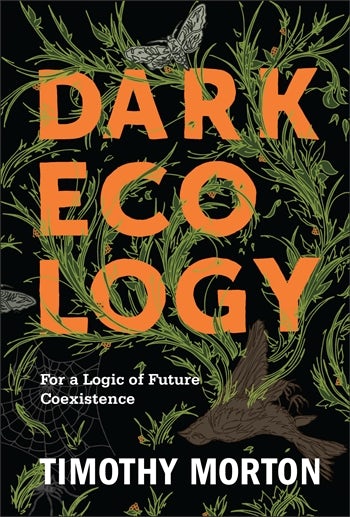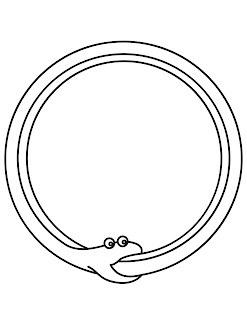"The Anthropocene doesn’t destroy Nature. The Anthropocene is Nature in its toxic nightmare form. Nature is the latent form of the Anthropocene waiting to emerge as catastrophe." -Timothy MortonClimate Collapse, or Anthropo-Implosion?
 |
| Dark Ecology, my edition's cover |
With
the normalization of the internet, there comes the proliferation of information
and its ease of access. In tandem with this internet age has come the current
concern surrounding global warming and the effects it will have not only on our
ecologies, but us ourselves. Currently, we have already passed several points
of no return in terms of saving out planet from warming, and now leading
climate scientists are still looking toward mitigation rather than prevention. Even then, prospects are
still dim: the petrochemical industry is still chugging along, so much so that the fossil fuel consumption has increasedrather than decreased. Secondly there is the problem of global food production, and its leveling of local
ecosystems into monocropped fields prone to blight and nutrient deficiency. Instead
if assisting in curbing these chronic issues, both the state and media have remained complacent in the destruction of our planet. Rather than tackle capitalistic origins of this current crisis,
they go after the individual: eat less meat, drive less, don’t use plastic
straws—you’re the cause of climate change, not corporations.
In short, neoliberalism has failed
us, and the price of such failure will be the collapse of civilization (something that is already happening for indigenous communities and islanders). Coming part and parcel with this is
a new brand of environmental nihilism that’s seemed to permeate the current
climate culture. This nihilism is in fact so pervasive that recently there has
been the attribution of all sorts of names to it: eco-anxiety, climate depression, and eco-grief, just to name a few.
This depressive nihilism can imbue one with a What’s the point? sort of attitude toward climate change. It seems
that the apocalypse is inevitable, so why try to change anything?
This is the milieu I’ve found myself
in time and time again, and which Timothy Morton’s Dark Ecology attempts to mitigate. Here, Morton offers a pathway
toward hope in an otherwise hopeless culture of climate-collapse writings. But
unlike more utopian pieces, Dark Ecology’s
hope doesn’t lie in the myth that we can still somehow save ourselves from this
wicked problem. Rather, the hope is in rethinking what it means to be a
species, what it means to be a global force, and what it means to be in the
Anthropocene.
I Am (in) a Strange Loop
"Ecological awareness is a loop because human interference has a loop form, because ecological and biological systems are loops. And ultimately this is because to exist at all is to assume the form of a loop." -Timothy Morton
 |
| The infamous ouroborous found all in the book |
Dark Ecology is
divided into three separate “threads,” each ending with the image of an
ouroboros. Which makes sense, as loops are abound in this book. Loops of logic,
of being. Feedback loops. Strange loops.
Now what exactly are these loops? I can’t
quite say, because whenever Morton describes their nature his language is
similar to that of a loop: a long and winding journey that ultimately brings
the reader nowhere but back to where they started. In fact, it’s such language
that does some of the greatest detriment to the genius at the bottom of this
book. Morton’s writing can be best described as haphazard, which is bad when
you also throw in his pop culture references, and even worse when you consider
his penchant for creating new terminology with only vague descriptions. It is
on this front that Dark Ecology seems
to bring out the worst of critical theory’s tropes, which is really unfortunate
because this is one of the critical theory texts I’ve read that’d I think would
be most beneficial if written for laymen.
But perhaps my criticism in this aspect is
just a bit too harsh. After all, one of the main goals of this book is helping
to reader gain a sense of what Morton calls ecognosis—and hey, what’s
a gnostic awakening if not confusing? He tackles some complex questions here,
questions that not only challenge temporalities and scales but blow reality as
we know it out of the water completely, so I guess it seems only a little
understandable that reading such challenges would cause a fair sense of
befuddlement. Nonetheless, the third “thread” of Dark Ecology is a near-unreadable nightmare because of the reasons
stated above. Walking away from it I felt like I could have stopped at the
second thread and missed few things of import.
The Big Green Monster
"Agrilogistics promises to eliminate fear, anxiety, and contradiction—social, physical, and ontological—by establishing thin rigid boundaries between human and nonhuman worlds and by reducing existence to sheer quantity." -Timothy Morton
 |
| Morton to one side |
 |
| Aaaand Kripal to the other |
Let’s look at one of these right
now, the most important of the important ones: Agrilogistics. This is one of
the few concepts that Morton defines clearly and coherently, and he defines it
thus: “a specific logistics of agriculture that arose in the Fertile Crescent
and that is still plowing ahead. Logistics, because it is a technical, planned,
and perfectly logical approach to built space.” To borrow another of Morton’s
terms, agrilogistics is a hyperobject,
a construct so inexplicably huge that it exists both within and outside of our
temporal awareness. It is the operating system by which the Neolithic was
initiated—an operation of eliminating contradiction and reducing ecology into a
quantifiable use-value. As Morton argue in the Dark Ecology, it is the logic to rule all logics, the bringer of
not only agriculture, but the man-nature divide as well, and that divide’s
inevitable consequences: the Anthropocene.
The idea in and of itself should be
enough to put Morton on the required-readings list of literally anyone
interested in ecocriticism, and from its epicenter branch out, like tentacles,
several other concepts which carry heavy theoretical significance: arche-lithic, easy-think substance,
ecognosis, and of course, dark
ecology. The discourses generated by these all coalesce into the final
statement of the book, that it is by seeing and rejecting the agrilogistic
model that we can work toward a multispecies solution to climate collapse.
The Mental Labyrinth
"'Civilization'" was a long-term collaboration between humans and wheat, humans and rock, humans and soil, not out of grand visions but out of something like desperation." -Timothy Morton
Before
Morton, I had only ever read works by one Rice professor (despite Houston
itself being so close to where I call home): Jeffrey Kripal, a religious
studies professor with an avid interest in religious experiences and…alien abductions. Kripal was a weird read.
Morton was a weird read. So it shouldn’t have come as too much a surprise when
I encountered citations of Kripal’s The
Serpent’s Gift in this book. But I was surprised, in a good way.
I was a kid when Hurricane Rita came
through and tore up the gulf area of Southeast Texas. My family, we evacuated
to my uncle’s place up in Marble Falls, arriving sometime shortly after the
opening of the town’s fall festival. There was a corn maze there in the shape
of Texas, and in the maze were eight different “towns” to visit, each town
being a signpost with a hole-puncher chained to it. You were given a card and
were supposed to traverse the maze and get your card punched once at each of
the towns, then upon leaving the maze you won a free drink. It wasn’t like a
regular maze where you go out one side and come out the other, then: here the
beginning was the end, and the goal wasn’t to make it out the other side, but
to discover everything you had to before going back the way you came.
That’s what reading Dark Ecology made me think of. That
maze, the idea that I wasn’t trying to hurry and finish it so much as I was
taking my time getting my bearings on everything I needed, no matter how long
that took. I was working assiduously to punch-in all the major concepts.
I finally did come out of the maze
that is Dark Ecology, and I did so
with quite a few new concepts under my belt. I didn’t complete my punch card,
though, even if I got close. I never won my free drink. But the analogy end
there. The thing about the maze is its only open one month of the year, then
closed the other eleven.
Dark
Ecology, though. It never closes. It’ll still be there waiting for me when I’m
ready to go back in, and deep down I know that someday I will be ready.


No comments:
Post a Comment